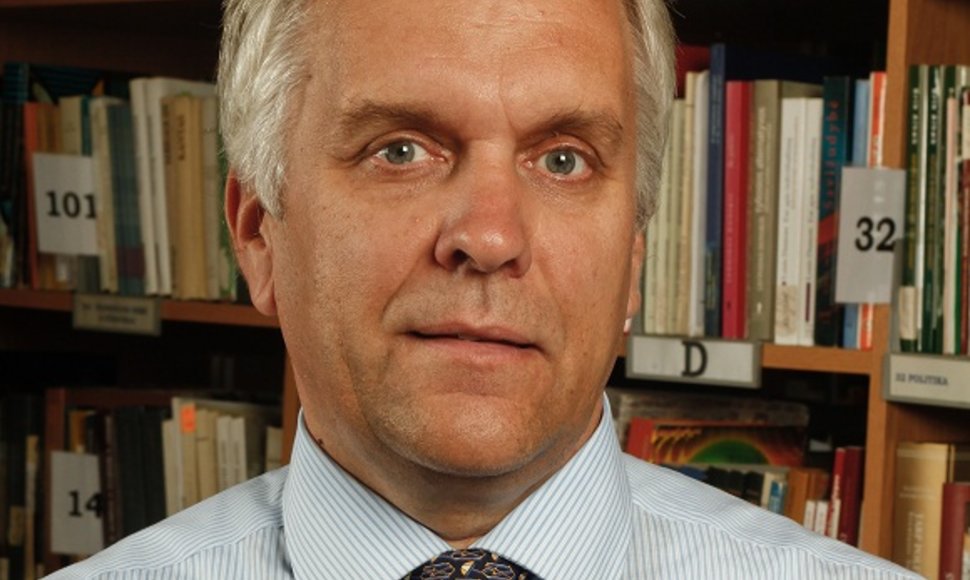“People read papers and on-line news with their breakfast, but are too lazy to go to the polls to vote and would rather do it via on-line banking systems that are being presented as something extremely progressive,” said Mr Jokubaitis in a public lecture held recently in the Institute. “We're all very talkative, but spineless workers. We watch wars on television or online, yet we are afraid to get involved into anything more than our private economic interests. We are spectators and observers of the political show, but we are unwilling to become players in political life.”
There are certain fundamental political contradictions, the professor believes, that are characteristic of our time, including: civil society, attempts to abandon political sovereignty, democracy, the idea of the nation state, etc. “According to Hegel, what makes the world is the developing mind or developing spirit. This world spirit advances forward through series of contradictions and therefore we must grasp these contradictions.”
Civil society
Civil society is what prevents us from developing the public spirit.
Civil society is highly revered in Lithuania. However, the idea of civil society contains a major contradiction. “Civil society is what prevents us from developing the public spirit. Why? Because, contrary to what Hegel though, today it is not the state that exceeds civil society, but civil society that overtakes the state.”
Following Hegel, we perceive civil society as an intermediary between individuals and the state. That is, individuals assemble in public arena where they discuss communal matters and send a message to the state. They thus lend the state legitimacy and control it, communicate their view of things.
“Yet from the very start, the notion of civil society, much like the notion of free market, was conceived as a restraint on the state. It was claimed that citizens can rule themselves without the state. But is such view not Utopian?”
Civil society prevents individuals from being active. As Hegel put it, “In civil society, everyone is an end for himself and everything else is unimportant.” That is to say, civil society does not only stimulate political action but also engenders its paralysis. “Such is the nature of this bourgeois civil society. Citizens, immersed in their private business, become indifferent to the state and politics. They take care of their personal needs, they respect human rights, they abide by the law, but they start shunning politics and state affairs.”
Citizens turn into consumers, homini economici, and want as little of politics and the state as possible. Then they feel free and less constricted. “It is not only the state that can negate civil society, but also individuals. Today, citizens of the Western countries, including Lithuania, have no more need for the state as well as another intermediary in human relations – family. Two post-communist decades have shown how little we understand the contradictory nature of civil society.” According to Mr Jokubaitis, one needs not idolize the state, but one shouldn't lose respect for it either.
Renouncing sovereignty
Jean-Jacques Rousseau once said that one can reject government, but it is quite impossible to reject sovereignty because it is indivisible. “Today, sovereignty is being constantly divided with many excuses made up for that purpose. We realize that it is impossible to reflect politics without the notion of sovereignty, yet we find enough reasons to forget that notion, to limit or experiment with it. The thing that forms the basis of political thinking becomes a hostage and a pawn.”
Americans are very fond of the limitless global free market. At the same time, they protect their border with Mexico with walls of concrete and iron.
Economics gets placed above political sovereignty. “That is hardly surprising. But if we want to talk about politics, we cannot get away without sovereignty. If we do, the very thing that we renounce sovereignty for takes the sovereign's place and itself becomes the sovereign. This presents a contradiction. We divide what is indivisible. We give the sovereign's place to something in what's favour we do it.”
Ruling a country requires an understanding of the country's geographical and spiritual limits. According to Mr Jokubaitis, if rights of man are put above sovereignty of the state, it becomes unclear what politics is all about, because sovereignty is the basis of the politic. No political entity can unfold without any limits. It is impossible to build politics without the notion of sovereignty.
“Americans are very fond of the limitless global free market. At the same time, they protect their border with Mexico with walls of concrete and iron. The more we waste our sovereignty, the more concrete and iron we'll need. We want things that are irreconcilable. We can see that the world is wider than the existing sovereigns and yet we cannot reflect politics without this notion.”
Mistrust of governments
No less contradictory is the notion of democracy. “The contradiction emerges once we realize how constantly we are dissatisfied with our own elected representatives. The object of our anger, discontent and grudge is the product of our own creation.”
We elect our representatives and then try to control them. In order for the trust-based electoral democracy to work, there must be a counter-measure, democracy of mistrust.
“One must admit that we are ruled by our misguided choice and mistrust. Or, alternatively, the forms of legitimizing power must have changed dramatically. With every new election, citizens are going to vote “against” rather than “for” something and, once again, get burnt. A year later, at the end of the electoral honey-moon, they will again resent the government and “Vilmorus” polls will show how it looks in figures.”
Such situation poses danger that a line will be crossed when citizens will know no more than denying and mistrusting. “This strange form of polity, of democracy, is constantly balancing on the boundary of the apolitical. On the boundary where one wishes to withdraw from politics altogether. Democratic elections increasingly take on a ritualistic meaning – a short moment that gives us a shot of communal feeling but soon ceases to legitimize power.”
Liberalism and democracy
There is also a contradiction between liberalism and democracy. They are two different philosophies even when they are merged into one – liberal democracy. What is the difference between the two philosophies? “Liberalism protects, obliges, and defends. Democracy unites, extends, creates a communality.”
Liberals defend moral individualism, democrats tend to the common good. “Liberals are first and foremost concerned with how much the government interferes into individual's affairs. Democrats are interested in who rules us. Liberals are always cautious about democracy. They think it a good means, but democracy might well become negation of liberalism. Germany in 1933 is the most outstanding example.”
Besides, there are numerous theories where liberalism presents itself as a sine qua non of democracy. “In this case, what comes to mind are declarations by Chinese and Russian leaders to the effect that their countries also have democracies, only of different kind. But how many kinds of democracy are there?”
The concept of nation state
Another contradiction characteristic of the West, according to professor Jokubaitis, are the attempts to deny the nation state. “We think that a nation can no longer be a sovereign. Nation, formerly an object of faith, now turns into fiction. But what is being offered instead cannot create any sustainable political form worthy of the name of democratic political entity.”
We think that a nation can no longer be a sovereign.
If Lithuanians had not perceived themselves as a nation in the 19th century, they would not have established a state. What has changed? “Nation helped establish democracy, but now we want democracy without nation. Are we not cutting a branch that we sit on? Lithuania is slowly sliding back into the times of Motiejus Valančius (mid-19th century), a period in between the defunct – but still alive in people's collective memory – Grand Duchy of Lithuania and the modern nation state of 1918.”
The professor quotes Hegel again: “In world history, one can only talk about nations that established a state.” “If it is not the nation that creates a state – then who? We can look for other options but what's wrong with this one?”
He also notes that there is always one world-dominating nation that pushes the spirit of history forward. But this nation is bound to retire eventually, because the logic of this spirit does not coincide with this nation alone. “Americans are distraught that the world spirit will discard them along with this era. It is inevitable. The same happened to Roman Empire. Looking back into their past, Italians can hardly believe that the eternal Roman Empire would turn into Italy.”
Lost faith in ideologies
Up until the 18th century, people reflected on politics without any ideologies. Today they are the basis of political action. “Ideologies are copycats of Christianity, they are a secular form of attemtps to redeem citizens' souls. In other words, one must produce certain ideas and implant them into citizens' heads. But ideologies need people to have faith in them to survive, faith which is evaporating fast.”
There is increasingly little faith in ideas created for political struggle. “And here we encounter a contradiction: there's no more faith in ideologies, yet the current political system can only function with ideological divisions. If citizens don't believe in political ideologies, they inevitably lose faith in the meaningfulness of joint political quests and are increasingly hard to mobilize for a common political action.”
Finally, there is a growing contradiction within the ethics that once inspired capitalism. “When capitalism emerged, it was inspired by a certain ethics. The current form of capitalism has wasted this ethics or rejected it altogether. Has our cultural spirit come to contradict our political spirit?”













